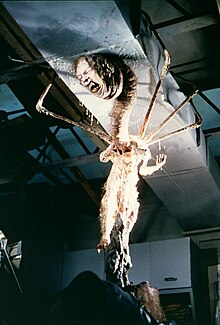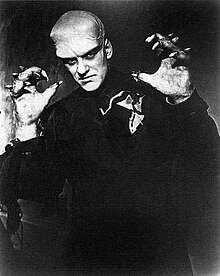| The Thing | |
|---|---|
| The Thing character | |
 The Thing in a publicity photo of the 1982 film The Thing in a publicity photo of the 1982 film | |
| First appearance |
|
| Last appearance |
|
| Created by | John W. Campbell |
| Portrayed by |
|
| Stunt performers | Anthony Cecere (1982) |
The Thing is a fictional shapeshifting and telepathic alien and the titular antagonist of the science fiction horror franchise of the same name. It first appeared in the novella Who Goes There? by John W. Campbell, which has been adapted into various media, including films, literature, and video games.
Fictional character biography
In Who Goes There?, the Thing is discovered by a team of Antarctic scientists frozen in its spaceship, which had crashed on Earth 20,000,000 years before. After it thaws, it kills and takes the form of the team's physicist, Connant, unbeknownst to the others. It uses its leftover body mass to transform into a sled dog. The team discovers the dog-Thing and kill it as it is transforming. The pathologist of the crew, Blair, goes insane with guilt as he was the one who had lobbied to thaw the Thing. He vows to kill everyone at the research station in order to save mankind from the Thing, and is locked in a cabin. The crew destroy their vehicles in order to isolate the base, but pretend that everything is fine in radio transmissions in order to prevent rescue attempts.
The crew attempts to discover who among them may have been assimilated and replaced by the Thing in order to kill the imitations before they escape. In a blood test, they discover that either Doctor Copper or commander Gary is an imitation, but the result is inconclusive. Assistant commander McReady (known as R.J. MacReady in the 1982 film) takes over the crew and determines that all the animals at the station, except for the dog used for the blood test, have become imitations. As such, the crew kills all of them and burns their bodies.
By this point, the entire crew suspects one another, and the men begin to go mad wondering if they are the last human left, or if they would be able to tell if they weren't human. After the cook, Kinner, is murdered and revealed to be the Thing, McReady discovers that every part of the Thing functions as an individual organism. He then uses this fact to test each surviving crew member by dipping a hot wire into samples of their blood. When a blood sample recoils from the heat, the owner is instantly killed. Fourteen crew members are revealed to be the Thing and are killed. The remaining men go to test Blair, who is still isolated in the cabin, and discover that he had already been converted. After McReady destroys the Thing with a blowtorch, it is revealed that it had almost completed building a nuclear-powered anti-gravity device that would have allowed it to escape to the outside world.
Production history

Who Goes There? was first published in the August 1938 issue of Astounding Science Fiction. An extended version with two extra chapters was later published in The Best of John W. Campbell. In 2018, it was discovered that the story was originally part of a longer, unpublished novel titled Frozen Hell, which was discovered in Campbell's papers. The novel was published in 2019.
In 1951, The Thing from Another World was released as an adaptation of the story. James Arness portrays the Thing, which in this version is a humanoid plant-based organism that feeds on animal blood. The Thing was portrayed in a costume.
In 1982's The Thing by John Carpenter, $200,000 of the budget were originally dedicated to creature effects, which at the time was more than Universal Pictures had ever allocated to a monster film. After designs for the creature were completed, the film's crew estimated that they would need around $750,000 for the effects, which Universal agreed to. The effects were designed by Rob Bottin, except for the Thing's dog form, which was designed by Stan Winston.
In 2011, a prequel to the 1982 film was released, directed by Matthijs van Heijningen Jr., which was created using computer-generated effects for the Thing in addition to practical effects. However, in the film's production, most of the practical effects were replaced with computer effects.
Character symbolism
In the 1951 film, the Thing has been considered symbolic of communism during the Cold War, with the battle against the alien impostor being symbolic of McCarthyism. Similarly, in the 1982 film, the Thing sows distrust among the crew members, representing anti-communist paranoia and the Red Scares. While the original film portrays the battle against communism as a noble battle against evil, the 1982 version comments on the paranoia, distrust, and social upheaval that the Red Scares caused.
Reception
In 1973, Who Goes There? was voted by the Science Fiction Writers of America as one of the stories representing the "most influential, important, and memorable science fiction that has ever been written." As a result, it was published in The Science Fiction Hall of Fame, Volume Two.
Although The Thing from Another World was originally received unfavorably by critics, it would later be considered one of the greatest science fiction films of the 1950s. In 2001, the film was selected by the United States Library of Congress for preservation in the National Film Registry.
Like its predecessor, John Carpenter's The Thing was originally met with negative reception, being called "foolish, depressing", and "instant junk" by critics. Cinefantastique described the titular alien as "the most unloved monster in movie history". Despite this, the Thing's portrayal with practical effects was praised as technically brilliant. In spite of its original negative criticism, the film has made significant contributions to popular culture, and has become a cult classic. The film has been described as "ahead of its time", and the "best remake of all time". As such, the titular character has become one the most popular fictional aliens in cinema.
The 2011 film also received a negative response, with IGN comparing the film to the Thing itself, calling it "an insidious, defective mimic of the real, er, thing". In particular, the Thing's computer-generated depiction was compared negatively to the 1982 film's practical effects.
References
- Liptak, Andrew (2018-10-21). "A new Kickstarter project will publish an undiscovered novel that inspired The Thing". The Verge. Retrieved 2023-08-11.
- Cohen, Stuart (2013-06-25). "A producers guide to the Evolution and production of John Carpenter's The Thing – The Budget". The Original Fan. Retrieved 2023-08-11.
- "Stan Winston's dog-thing from 'The Thing' -- Creating an Iconic Alien". www.stanwinstonschool.com. Retrieved 2023-08-11.
- "Alien and The Thing FX master Kickstarts CGI-free film". SciFiNow. 2013-05-18. Retrieved 2023-08-11.
- Smith, Jeff (2014). Film Criticism, the Cold War, and the Blacklist: Reading the Hollywood Reds. Berkeley, California: University of California Press. p. 9. ISBN 978-0520280687.
Similarly, once critics identified Invasion of the Body Snatchers as a film expressing an underlying tension about the threat of communism, others found similar patterns in The Thing (1951).
- ^ "15 Reasons Why John Carpenter's The Thing Is The Best Remake Of All Time". ScreenRant. 2016-08-29. Retrieved 2023-08-11.
- Clarkson Fisher, Daniel (August 13, 2017). ""Just Wait": On the 35th Anniversary of John Carpenter's The Thing (1982)". Diabolique magazine. Archived from the original on March 18, 2018. Retrieved August 11, 2023.
- Bova, Ben (1973). The Science Fiction Hall of Fame: Vol. 2A. Doubleday.
- Growther, Bosley (1951-05-03). "THE SCREEN: TWO FILMS HAVE LOCAL PREMIERES; 'The Thing,' an Eerie Scientific Number by Howard Hawks, Opens at the Criterion 'Communist for F.B.I.' New Picture at Strand Theatre, Features Frank Lovejoy At the Criterion". The New York Times. ISSN 0362-4331. Retrieved 2023-08-11.
- "1950s Sci-Fi Movies". Time. 2009-07-23. Archived from the original on 2009-07-23. Retrieved 2023-08-11.
- "The Thing from Another World, 1951 - 1950s Sci-Fi Movies - TIME". Time. 2008-12-12. Archived from the original on 2008-12-12. Retrieved 2023-08-11.
- "Librarian of Congress Names 25 More Films to National Film Registry". Library of Congress, Washington, D.C. 20540 USA. Retrieved 2023-08-11.
- "'The Thing,' Horror And Science Fiction". The New York Times. 2023-08-10. ISSN 0362-4331. Archived from the original on 2013-10-26. Retrieved 2023-08-11.
{{cite news}}: CS1 maint: bot: original URL status unknown (link) - ^ Hogan, David J. (November–December 1982). "Cinefantastique - Contents". Cinefantastique. Retrieved August 10, 2023.
- Arnold, Gary (1982-06-25). "The Shape Of 'Thing' Redone". Washington Post. ISSN 0190-8286. Retrieved 2023-08-11.
- Thurman, Trace (2017-06-25). "John Carpenter's 'The Thing' Turns 35 Today!". Bloody Disgusting!. Retrieved 2023-08-11.
- "How John Carpenter's The Thing went from D-list trash to horror classic | SYFY WIRE". Syfy. 2018-01-17. Archived from the original on 2018-01-17. Retrieved 2023-08-11.
- "John Carpenter's Sci-Fi Horror Film 'The Thing' Was Ahead Of Its Time". www.wbur.org. 9 January 2020. Retrieved 2023-08-11.
- "The Thing Review - Movies Review at IGN". IGN. 2011-10-15. Archived from the original on 2011-10-15. Retrieved 2023-08-11.
| The Thing | |
|---|---|
| Literature |
|
| Films |
|
| Video games |
|
| Characters | |
- The Thing (franchise)
- Characters in written science fiction
- Extraterrestrial characters in films
- Extraterrestrial characters in literature
- Extraterrestrial supervillains
- Fictional amorphous creatures
- Fictional extraterrestrial species and races
- Fictional impostors
- Fictional monsters
- Fictional parasite characters
- Fictional shapeshifters
- Fictional telepaths
- Horror villains
- Literary characters introduced in 1938
- Science fiction film characters